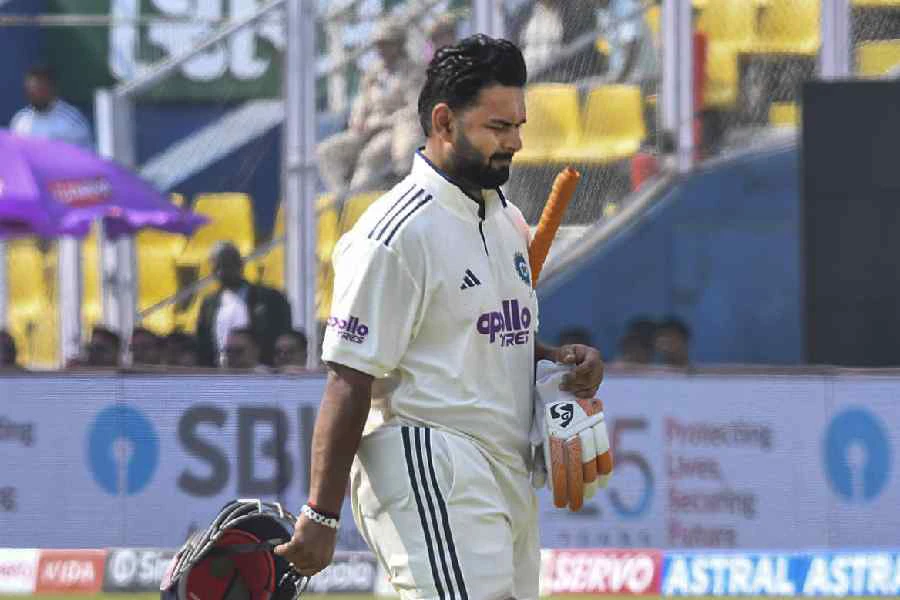Justin Langer has accused England of showing a “lack of respect” for Test cricket after their two-day defeat in the Ashes opener in Perth.
Across the globe, the Indian team could be indicted for a similar offence after their batting collapse in Guwahati on Monday threatened Gautam Gambhir’s men with another series whitewash at home in the space of a year.
It was mindless batting as Marco Jansen returned a magical six-for, including four with hostile short-pitched stuff, after Simon Harmer and Keshav Maharaj’s bounce and turn off the wicket started the slide.
Washington Sundar and Kuldeep Yadav batted together for nearly 35 overs to prove that there was no demon to trigger the collapse of six wickets for 27 runs in the second hour.
An unsettled batting order contributed to the panic which gripped the young line-up. It was best exemplified by Rishabh Pant’s vacuous charge at Jansen, only to be caught behind. When the captain needed to show responsibility, he ended up highlighting his lack of maturity and insight.
“That is just a brainfade shot,” Dale Steyn wrote on X, portraying the abject lack of sense and refusal to learn from mistakes. Pant had hit a six off Harmer, the second ball he faced, then seen Dhruv Jurel sacrifice his wicket, but still couldn’t control his instincts.
“That is the way he plays,” has often been cited as an excuse in his defence, but Test cricket is about showing patience, application and curtailing the high-risk, high-reward approach. How long will he be allowed to continue with such an insane show of disregard to the circumstances?
Why blame Pant alone? The fearless attitude of white-ball cricket seemed imbibed in the players’ impulse, largely playing the invisible hand in most of the dismissals.
Washington Sundar (48) was still the second-most successful batter after Yashasvi Jaiswal’s 58. The team management has been playing Russian roulette with Washington’s batting position, slotting him at No. 5, 8, 9, 7, 3, 3 and 8 in his last seven innings.
He has never been allowed the opportunity to get accustomed to a specific position in the quest to fit in more all-rounders in the playing XI. The No. 3 spot has been a comedy of errors, with the batter’s insecurity often resulting in his inability to flourish in his role.
This loss of faith and failure of hope is being depicted across the batting order. Sai Sudharsan was lucky to regain his No. 3 position in this Test. But his confidence has been brutally punctured.
Sai hasn’t earned his berth on the back of a terrific first-class record, but his IPL exploits made his task easier. Players with a better first-class average, like Sarfaraz Khan, Karun Nair and Ruturaj Gaikwad, have continued to remain on the sidelines.
Since Shubman Gill moved to No. 4, Sai played five Tests at the vacant No. 3 spot at an average of 30.33. His replacement in two Tests in England, Karun Nair, could have been an ideal choice in these conditions, but he is no more the favoured one.
Nair made a cryptic post on X. “Some conditions carry a feel you know by heart – and the silence of not being out there adds its own sting,” he wrote.
Sarfraz Khan, who enjoys an awe-inspiring average of 110.47 over the last five years in the middle order, has been ignored with no clarity for his snub since the Australia tour, where he didn’t get to play a single Test.
But does domestic performance really matter? When was Ajit Agarkar last seen at a Ranji Trophy match? Sources said that a common refrain of his colleagues is that the chief selector calls the shots at meetings, without giving them a fair hearing.
Does the national selectors keep a track of domestic performances or are they happy touring overseas with the national team? Has there been a sincere and concerted effort to unearth a potent No. 3 from domestic cricket? For a team grappling with rude home truths, finding clarity at No. 3 could be central to restoring balance in the batting order.
Until then the utter “lack of respect” for Test cricket will continue to haunt India.
